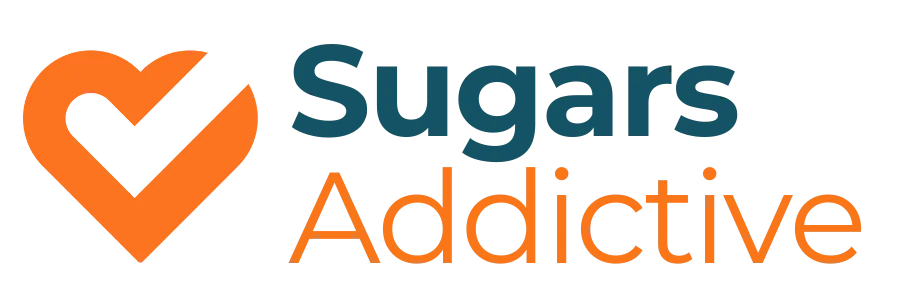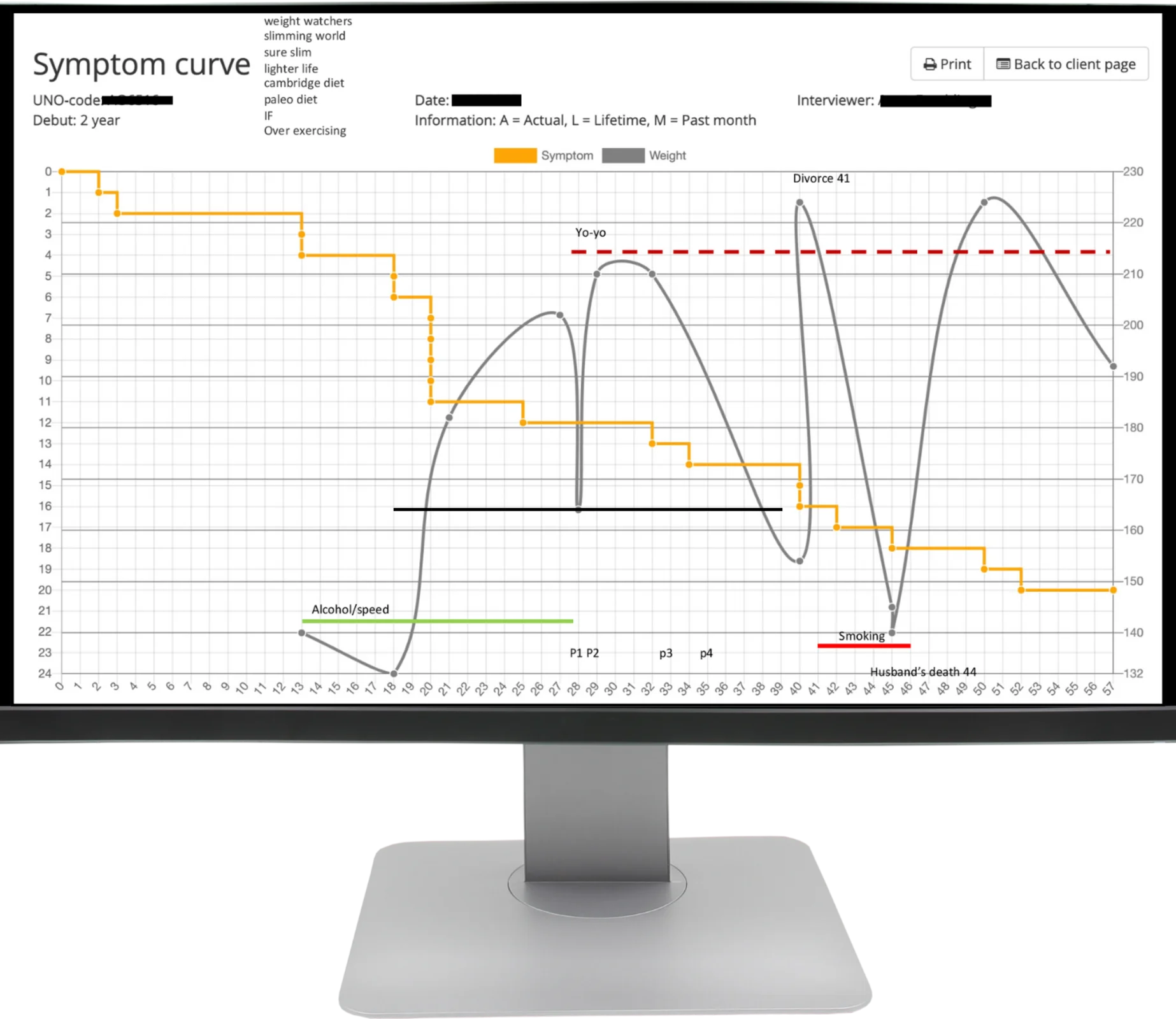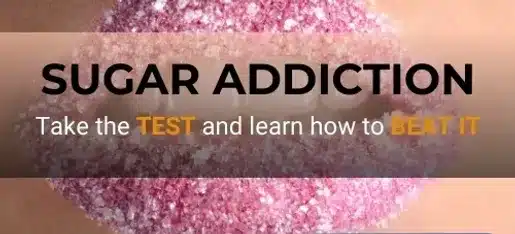Table of Contents
I appreciate that those with weight loss problems may be afraid of the term “addiction”. That was me in the beginning too, I would never have considered to ask my myself such a question, am I addicted to sugar …never!
But actually, I found it empowering and motivating being diagnosed as a sugar addict, that my issue is addiction because addiction is a brain disease and not a substance issue. In other words, we became hooked – I was addicted to sugar!
Are you addicted to sugar?
Diagnosis gave me the answer to the weight problem I had been struggling with for over 40 years. Those years are such a blur, hi-jacked by constant dieting and crushing weight gain.
In the end, I found food unmanageable and my weight out of control.
Diagnosis, treatment, and ongoing relapse prevention work have been key to my own recovery – working a simple, sobriety-based treatment programme. Had I not been diagnosed; I know I would have carried on repeating the same mistake over and over and expecting a different outcome – overcoming sugar addiction!
So, in this post I would like to define the 3 categories of food users and challenge you to consider which one is you?
Am I addicted to sugar? It all begins with a quick test. Use the S-UNCOPE assessment test comprising of 6 simple questions to give a true indication of the likelihood of addiction being an issue for you.
The post concludes with a series of prompts that will help you determine your next course of action.
What are the 3 Types of User?
There are three main categories of user: self-regulators or social users; harmful users and addictive users. Knowing the difference between addiction and harmful use will get you started in the right direction. The following paragraphs outline their definitions:
Self-Regulators
This category of people can regulate what they eat. They know when they have had enough, and they know when they are hungry, and they know when to find food. Their hunger receptors and satiety hormones: leptin and ghrelin are working well, and they can take or leave the food in front of them no matter what. They may use phrases such as: I’m full, I’ve had enough, I’d like a smaller portion. We can define this category of people as self-regulators or social users. Is this you?
Harmful Users
This category of people will use food for comfort, for coping and for celebration. They will be stress eaters and eat when they are tired. Their actions will have consequences (as they often overeat) including weight gain and obesity issues leading to insulin resistance. However, they do not have obsessive or compulsive thinking around food and so their action is harmful but not addictive. Is this you?
Addictive Users
This category of people will find food unmanageable. They lose control of themselves around food particularly sugary items and processed junk food. They feel driven to consume and cannot stop thinking about food or how to consume it, how to buy it and the next chance to eat it. These folk are driven by cravings and often to act on impulse. Addicted users eat no matter what. It is their default position, and they often overeat. It is the disease that drives the behaviour and the addict’s next step. Is this you?
Which category are you?
Am i addicted to sugar?
Now that you have read the 3 categories, you may have an inkling as to which category is you. The next step is to take the S-UNCOPE simple assessment test for screening for addiction. Two or more results may indicate that addiction is likely to be an issue for you. Take the S-UNCOPE assessment.
If the S-UNCOPE test is showing that you are a harmful user – it is over and out. We will love you and leave you here. You will have success with moderation if you persevere and you will be able to work through any outstanding issues with a therapist or health practitioner.
Diagnosis is Key

If the above tests are showing a likelihood of addiction being the hidden issue behind your constant craving, we recommend a full SUGAR ® Evaluation. Our ground-breaking SUGAR Evaluation will give you a definitive diagnosis – and until we have that, there will always be guesswork: am I or am I not?
That is particularly unhelpful when dealing with the disease of addiction. Because at the point where we start to feel the full benefits of recovery, we will convince ourselves that we were never addicted in the first place. And from that point it is a slippery slope back down into unmanageable food, uncontrollable weight gain and just a gigantic heap of misery. Recovery is about change, and we must change everything.
Change must be wholehearted and sustainable and to do that, we need to be motivated and educated.
How can I stop being addicted to sugar?
A SUGAR Evaluation will do this and will help you get to the heart of the matter. A diagnosis of sugar addiction has been my own North Star, helping me hold onto my position in recovery and urging me to course correct when I feel off course.
We know and accept that the issue is addiction, that the brain has been hi-jacked by the dopamine reward system and that this disease is chronic, progressive, and ultimately fatal. Like any chronic disease we must learn to manage the flare ups and we do this through knowledge and education. After all, when asking our original question, Am I addicted to Sugar. Professional diagnosis provides clinic proof and the answers so many are looking for.
But first we must diagnose.
Next Steps
If you would like to explore diagnosis, you are warmly invited to book a Discovery Call.
Over to You
If you have enjoyed this article, please share on your social media! Sugar stole forty years of my life, and I will never take my freedom for granted again!
Watch The Video: Sugar Addiction or Harmful Use
References:
- Sugar Addiction: From Evolution to Revolution: https://www.ncbi.nlm.nih.gov/pmc/articles/PMC6234835/
- Evidence for sugar addiction: Behavioral and neurochemical effects of intermittent, excessive sugar intake: https://www.ncbi.nlm.nih.gov/pmc/articles/PMC2235907/
1.
SCREENING
Diagnose For Addiction
6 QUICK & EASY QUESTIONS
Free Food Addiction Questionnaire
2.
DISCOVERY CALL
CONSULTATION CALL
Share your story and learn what our recovery programs will deliver for you.
3.
PROGRAMS
EVALUATION, DIAGNOSTICS & TREATMENT Professional Training, Education & Full on support.
Please Note: To be eligible for any of our treatment programs, you must complete the initial screening – Step 1. Should you have any difficulties in accessing the questionnaire via the link provided, please get in touch to make alternative arrangements.





